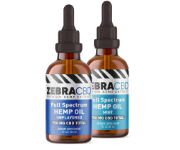
These days, CBD is everywhere. If you stroll down bustling commercial streets in most cities, you’re likely to encounter a few purveyors of fine CBD products. From CBD gummies to CBD oil and CBD tincture products, there’s something for everyone.
And when you consider all the potential ways CBD may be able to improve your body and your mind, you have to admit that the fervor surrounding this special supplement is enticing.
Yet, despite your curiosity, something is holding you back. Maybe you’re concerned about how CBD can affect you and you don’t want to have an unpleasant experience. Maybe you’re unsure about any CBD effects on hormones. Or you’re simply curious about CBD but aren’t ready to go all in, especially if you’re trying to determine the best CBD oil dosage for you. Whatever the reason, it’s understandable to be hesitant about CBD — after all, CBD supplements are still relatively new.
...starting with the lowest possible dose is recommended to get the desired effect.
Fortunately, there’s a solution for anyone looking for a low-risk way to get their toes wet in the glimmering pool of CBD supplements. It’s called microdosing, and it could be the perfect way to introduce CBD to your life and soak up its potential benefits.
CBD: A Quick Review
The fact that you’ve searched for a guide on microdosing CBD oil tells us that you aren’t totally unfamiliar with CBD products. Still, before we get into the hows, whys and what-fors of microdosing CBD, it’s worth quickly reviewing what CBD is and what it does.
CBD, or cannabidiol, is a chemical compound produced by certain marijuana plants. In fact, marijuana plants produce several of these types of compounds, known collectively as cannabinoids. One notable example is the chemical THC, which is responsible for the inebriate effect known as a “high” caused by some marijuana plants.
All marijuana plants contain some CBD, along with a range of other cannabinoids.
However, only CBD that’s derived from hemp marijuana is legal to grow, harvest and manufacture as supplements in the United States. And even that is a recent development: It wasn’t until the 2018 Farm Bill that hemp was declassified as an illegal drug and restrictions on its production and sale were rolled back.
And even though it’s federally legal these days, CBD production comes with a few caveats. The industry still faces several imitations, including:
- Only certain plants may be used – According to the Farm Bill, CBD can only be derived from hemp plants that contain less than 0.3% THC.
- Lack of sufficient research – At the end of the day, we just don’t know enough about CBD to know definitely how it impacts the body. There is hope, however. Some of the barriers to research were in place thanks to CBD’s status as an illegal drug. The 2018 Farm Bill does away with that designation and provides a path for further research.
- Not all states are on board – Because hemp and CBD remain illegal in a handful of states but legal in most others, there can be confusion surrounding the legality of hemp. As such, it’s important that you check with local laws.
Are There Any Health Benefits Associated With Using CBD?
A moment ago, we mentioned that a lack of sufficient scientific research is one of the primary obstacles that stunt the growth of the industry. Unfortunately, that also makes it difficult to say for certain how using CBD supplements may benefit your health or to what extent. Research is underway, but so far, the jury’s still out.
That said, CBD supplements are routinely marketed according to their potential to positively impact your physical and mental well-being — and these claims aren’t entirely baseless.
Although we still have an incredible amount to learn about the special relationship between CBD and the human body, there is some evidence that links CBD supplementation to certain health benefits.
According to various studies, taking CBD supplements may:
- Improve your mood
- Help manage aches, including joint discomfort
- Promote a more restful sleep
- Promote weight management (learn about CBD for appetite stimulation)
In some cases, CBD may help reduce stomach discomfort and vomiting associated with certain medical procedures.
There’s also reason to believe that CBD may help manage certain kinds of inflammatory responses, especially when applied topically. Some of the most popular methods of using CBD include CBD oils, edibles and even CBD energy shots, among an array of other products.
Okay, So What Is Microdosing?
The dictionary takes about 29 words to define microdosing, but the explanation is far simpler than that. Essentially, it’s the practice of taking a very small dose of a substance. Usually, these doses are consumed on a regular basis, although the frequency of consumption may vary considerably from person to person.
In most contexts, microdosing refers to drugs. When most people think of microdosing, they think of psychedelics like LSD.
The link between microdosing and LSD goes back to the 1950s when a group of Canadian therapists used one-time doses of LSD in experimental treatments. Since then, the practice has grown in popularity, if not exactly repute.
It’s important to note that the point of microdosing LSD or any other drug is not to experience the associated high or “trip.” Instead, the aim is to take just enough of the drug to receive the psychological benefits it ostensibly offers — mental clarity, improved self-confidence, renewed ambition — without any impairment, incapacitation, or inebriation.
When it comes to microdosing CBD, the goals differ somewhat, but the methods are about the same. You ingest a tiny amount of CBD (more on exactly how much in a moment) so that you get a boost of those potential benefits we mentioned earlier without any of the possible side effects.
Because, yes, like any supplement, CBD use does present the risk of a few side effects. Fortunately, whether you take a small dose, a larger dose, or incremental doses of CBD, it’s rare to experience side effects from CBD.
When side effects do occur, they’re typically pretty mild. They generally include:
- Diarrhea
- Drowsiness or fatigue
- Dry mouth
- Reduced appetite
For people who are worried about the possible side effects of using CBD or anyone interested in avoiding unnecessary discomfort, microdosing is the perfect way to experience the potential benefits of CBD while minimizing the risks.
A Beginner’s Guide To Microdosing
Are you still wondering what is microdosing CBD? Here are answers to those and other common questions.
How Much Should I Take?
Although there are certain guidelines you can adhere to when it comes to microdosing CBD, you’ll have a better experience if you’re taking the minimum effective dose that’s perfectly suited to your personal needs.
That said, determining your ideal CBD dose is sometimes easier said than done, especially if you’re new to the world of CBD. Fortunately, remembering one simple but important rule is all it takes to discover your optimal dose.
That rule? Ease yourself into it.
For example, starting with the lowest possible dose is recommended to get the desired effect. For most CBD products, this is about 5mg. Once a few days have passed and you start to sense how CBD affects you personally, you can modify your dose accordingly.
Additionally, there are some factors to keep in mind when determining your dose amount. A range of circumstances can affect how CBD interacts with your body, including:
- Your body weight
- Whether you’re taking CBD to help with a specific condition
- Your metabolism
- Your genetics
How Often Should I Microdose?
Like the amount you take, the frequency of your use will affect your CBD microdose. Typically, the effects of CBD can last for as little as two hours and as long as six, depending on the CBD product and the consumer. Some people treat CBD like a once-a-day vitamin while others consume it regularly throughout the day.
Keep in mind that CBD microdosing refers to taking small amounts. Knowing the right dose that works for you will help you determine how often you should microdose. You may also want to factor in things like:
- Your work schedule – Although CBD is legal in most states, a few states still view it as an illegal substance. And no matter where you are, your employer may have their own rules about consuming CBD while on the clock.
- Your other medications – Although CBD is generally considered safe, there is a chance it might not mix well with certain other medications you could be taking. For example, CBD has been known to interact negatively with certain blood thinners.
- Your side effects – If you’re microdosing correctly, then by definition, you shouldn’t experience many or any of the side effects that CBD can cause, like drowsiness or dry mouth. If you do, scale back your intake to a more manageable level.
Once you understand how your body responds to various amounts of CBD, many people find it helpful to develop a CBD microdosing schedule. This might not be necessary if you plan on microdosing once or twice a day. But if you plan to take a low dose of a CBD product regularly throughout the day, a schedule can help keep you on track and prevent missed or doubled doses.
Creating a schedule is as simple as keeping track of how much CBD you take and the intervals you take it and sticking to that schedule as faithfully as possible.
Take The First Step Toward CBD Wellness With Zebra CBD
When it comes to supplementing with CBD, practically everything comes down to the right dose. Unfortunately, too many supplement manufacturers make knowing how much CBD is in their products way more difficult than it has to be.
That’s where Zebra CBD comes in. At Zebra CBD, we rigorously and repeatedly test all of our CBD supplements, so we know they’re perfect — and we aren’t going to hide them behind confusing or misleading labels. With Zebra CBD, we put what’s on the inside on the outside where you can see it — just like our stripes.
If you’re ready to microdose CBD, shop Zebra CBD today to discover your perfect CBD product and CBD dosage.
Sources:
Cleveland Clinic. CBD Oil, Are The Benefits Claimed Too Good To Be True? https://health.clevelandclinic.org/cbd-oil-benefits/
Scientific American. Do Microdoses of LSD Change Your Mind? https://www.scientificamerican.com/article/do-microdoses-of-lsd-change-your-mind/
Zebra CBD. How to Determine Your Ideal CBD Dosage. https://zebracbd.com/blogs/cbd-education/cbd-dosage










